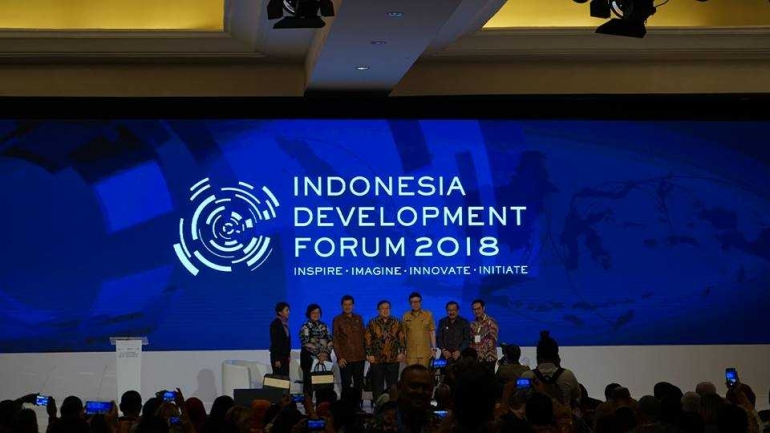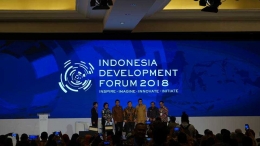INSPIRE PLENARY: High-Level Talkshow
The Governor of East Java, Dr. H. Soekarwo, explained about a project in East Java region supported by the central government, local governments and the business entities that are called the KPBU SPAM Umbulan Project.
This project utilizes the Sumber Umbulan water into drinking water which is going to fulfill the needs of clean water for its citizen that is going to be operated in 2019.
A Regent from Kulon Progo, a part of DIY, Mr. Hasto Wardoyo said in his presentation that the local economy should be independent in order to reduce disparity, for example, PAM Tirta Binangun has launched local brand for its mineral water named "Air Ku" and the production of local tea named "Teh Wangi Suroloyo".
The effort to reduce the disparity also has to be supported by the mindset of its citizen that needed to be reformed, the infrastructure development from hospital to the international airport and the development of the tourism sector.
The local governments play an important role to help their own villages to develop so that it will help the central government to solve the national disparity. Some projects are made in order to fulfill the needs of the citizen.
The local government also see that the mindset and the mental of the citizen should be transformed into a modern mindset so the development of the villages can be realized. Through that, we can see examples for some regions that the local government encourage the citizen to be innovative.
INSPIRE PLENARY: Regional Disparity and Its Context
A presentation delivered by Mr. Prof. Bambang P.S. Brodjonegoro as the Minister for National Development Planning and Head of the National Development Planning Agency (Bappenas) showed that there are human development's disparities for some regions in Indonesia, seeing that in 2017 the IPM (Indeks Pembangunan Manusia) of DKI Jakarta has the highest IPM in 80.00 however Papua is the lowest in less than 60.00.
Seeing from another indicator, Sulawesi region is the region in Indonesia that has the highest economic growth even higher than the national growth. So, Sulawesi can be a model in acceleration and equity in development for other regions.
These indirectly will give impact to the urbanisation level, that is why the government will anticipate it by directing the development of each region by focusing on several sectors, Papua region will be focus on development in food and natural resources sectors; Bali, Nusa Tenggara and Maluku on international tourism an fishery sectors; Sulawesi will be focus on Food Industry and Gerbang KTI (Kawasan Timur Indonesia); Kalimantan on processing industry and national energy barn; Java on trade and services sector and; Sumatera on new industry sector and Gerbang Kawasan Asia. In short, the disparities between regions can be solved by equitable infrastructure development.
H.E. Rudiantara, The Minister of Communication and Information Technology mentioned about the Palapa Ring Broadband which aims to provide better communication access in Indonesia by building an optical fiber network as the backbone of the national telecommunications system.
Other than that, in order to reduce the digital gap between region, the government has the High Throughput Satellite. This technology aims at providing broadband access for some areas that have yet been covered with broadband access. Other than these projects, the digital education is also needed to support the project.
Prof. Geoffrey J.D. Hewings from University of Illinois at Urbana-Champaign, United States said that some policies strategies that can solve the disparity in the case of Indonesia are by trying to understand more about how the inequalities are formed and persist, monitoring and evaluation techniques, paying attention to demographic drivers of development and convincing macro-policy makers that Indonesia have enormous degree of internal heterogeneity that has to be accounted for in the development of both spatial and spatially-blind policy formation.
Narrowing the Gaps at the Periphery
The speakers from different sectors present their method on how to respond to the disparities and gap. Ari Waluyo, the CEO and Co-Founder of Sehati Tele-CTG which runs in the medical technology sector attempt to help the citizen to have equal opportunities for healthcare services through telehealth-based community approach.
Sehati Tele-CTG (Cardiotocography) empowers, educates and helps midwives in Indonesia by providing the telehealth base technology and establishing the ecosystem by cooperating with some health facilities with the help and support from the government and the investors.
Suyanto Waspo Tondo Wicaksono, from Local Development Planning Agency in Banyuwangi explain about Banyuwangi's development priorities that focusing on education, health, farming, tourism, UMKM business, infrastructure, social protection and bureaucracy by upgrading the public facilities, reducing the poverty, cooperating with some agencies such as PT Angkasa Pura, ASEAN, Traveloka, GoJek, etc.
Arifin Rudiyanto as the Deputy Minister for Maritime and Natural Resources of National Development Planning Agency added that reduce the inequality is one of some goals in SDG, according to him, the stakeholders need synergy to share resources, experiences, knowledge, etc. The synergy itself is also including the trust building, equal partnership, participation, accountable and mutual benefit.
Another key to support the regional development in Indonesia is through the digital economy. In Samsul Widodo's opinion, as the Director General for Underdeveloped Regions, Ministry of Villages, Development of Disadvantaged Regions and Transmigration, digital economy development can also be an effective way, it can be seen that nowadays, digital has become an effective tool to do daily activities and can be used to do any kind of things and used by many people.
For Ronald Hartman, the Country Director, South East Asia and the Pacific Sub-Regional Office, International Fund for Agricultural Development, the rural transformation is important, it will reduce the rural poverty that will also give impacts to the economic development. Helianti Hilman, the CEO and Founder, Javara Indonesia also support the rural development, by mentioning the rural entrepreneurship that will help and support the development as well.
As we know, there are still some communities in Papua can't access the electricity, Isna Riski Safira from Bandung Institute of Technology, described an attempt to narrow the gap between regions. For Papua, a stirling machine can be considered as one solution to provide electricity for all of the people in Papua and of course, it is for the welfare of the citizens.
Writer:
Vera Hadinata
Intern
ASEAN Farmers' Organisations Support Programme - ASEAN Foundation









